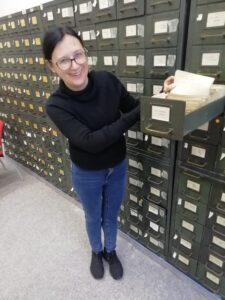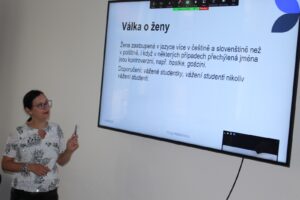STSM: The Linguistic Image of Women Emerging from Neologisms in Selected West Slavic (in the frame of Neology and Gender Equality in the Languages of Europe)
Name: Milena Hebal-Jezierska
Start : 21/09/2025
End: 27/09/2025
During recent research in the Czech Language Institute (Prague, Czech Republic), Milena Hebal-Jezierska had the opportunity to advance her study on the linguistic image of women emerging from neologisms in Czech, Polish, and Slovak. The trip was highly productive, allowing the grantee to combine fieldwork, consultations with experts, and hands-on work with specialized linguistic tools.
A key part of the visit involved individual consultations with leading researchers in the Czech Language Institute at the Czech Academy of Sciences. Milena Hebal-Jezierska also engaged in scholarly discussions with staff from the Institute of Slavic Studies and the institutes from Charles University, gaining valuable insights that enriched the analysis of her data.
An essential tool in the grantee’s research was Neomat, the Czech neologism database, and the local lexical card index and performing a comprehensive library query to collect supplementary materials. These steps were crucial for a comparative examination of neologisms related to women across the three West Slavic languages.

During the trip, the grantee delivered a lecture on this topic, which also highlighted the activities of ENEOLI and addressed the broader issue of gender equality in language. The lecture explored how women are represented in newly coined words, sparking lively discussions with the audience. The session was interactive, and the feedback received allowed the grantee to refine the presentation further, in preparation for the upcoming International Slavic Studies Congress in Madrid (October 14–17, 2025).

Following the lecture, she was invited to publish her research findings in the Slavic journal Slavia, a prestigious outlet indexed in WoS and Scopus. Additionally, Milena Hebal-Jezierska had the chance to share the results with a wider audience through a popular-science segment on the radio programme, bringing insights about the evolution of language and the representation of women in neologisms to the general public.
Overall, the trip allowed the grantee to successfully complete all planned activities, from expert consultations and database analysis to interactive presentations and dissemination of findings.

